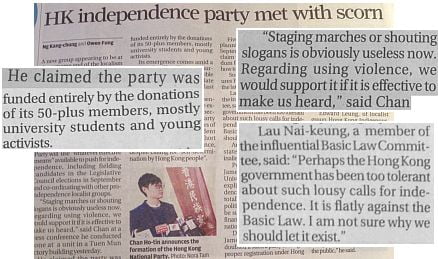Just as local officials have a hissy fit over the ‘N’ word in Taiwan universities’ names, young rebels decide to launch the Hong Kong National Party. Its aim: no less than to declare a Hong Kong Republic. This is going to go down like a cup of cold sick.
The South China Morning Post dutifully extracts disdainful quotes from patriots and commentators so it can report an outbreak of ‘scorn’ in response to the new group. By writing that the party ‘claims’ to be self-funded, the paper also implicitly suggests that evil hostile foreign forces are backing the group. If anything, the new political party will further splinter and cannibalize the existing pro-dem/indigenous/youth support base.
As well as antagonizing Beijing and its local loyalists, HKNP will challenge the local government’s already-weakening commitment to freedom of expression and rule of law. For example, in deference to Beijing’s hyper-sensitivity about splittists, local bureaucrats will be ordered to make life difficult for the HKNP if the group takes part in elections.
The extreme impracticality of the HKNP’s aim will make ordinary localism seem all the more moderate and mainstream. In order to counter the appeal of this rising movement, the pro-Beijing camp has to establish its own nativist credentials, hence calls for action against economic migrants posing as asylum seekers. This puts the loyalists at odds with the Hong Kong government, which is subject to international agreements on refugees. It also raises the possibility of the pro-Beijing camp going further off-script in exploring more ways to appeal to the Hongkongers-first vote.
The hapless CY Leung administration is already having difficulties keeping its supposed supporters in line. The boss of the Central Policy Unit calls out pro-government lawmakers for using pro-democrats’ filibustering as an excuse to goof off. Which of course they do – but who wouldn’t, in their shoes? Already hated for their association with an unpopular Chief Executive, the pro-Beijing parties are miffed at the criticism, and quite rightly so. You almost feel sorry for them.
It looks chaotic. But if we put all this in perspective, Hong Kong seems relatively sane. It is up north where things are really starting to look unhinged.
We are familiar locally with the Chinese leadership’s derangement when it comes to the subject of books. The (‘alleged’) abductions, forced confessions and apparent intimidation/blackmailing of the famous five booksellers have been accompanied by other curbs on the publishing industry. Some bookshops have stopped selling sensitive titles, and Chinese state-controlled firms have been displacing independent book retailers for some time – most recently at the airport.
Although Hong Kong feels threatened, it’s nothing personal. This is part of a broader, increasingly frantic top-level obsession with information and opinion. Beijing’s propaganda officials seem to have gone from pushing the official line to eliminating anything that isn’t the official line.
Xi Jinping’s February visit to China’s top media operations signified even greater centralization of thought. Some sort of backlash ensues. Outspoken individuals like tycoon Ren Zhiqiang are silenced. A Caixin magazine op-ed about censorship is itself censored. Pop songs praising Xi appear. Several newspapers suffer mysterious typos and juxtapositions that happen to protest the government. Then a letter calling for Xi’s resignation surfaces on-line. A more-sinister-than-average round-up of suspects takes place. Just in case there’s any doubt that the core leadership is in full freak-out mode, the security apparatus kidnaps overseas critics’ family members.
We cannot tell what is happening. Is this just the way Xi is – a new megalomaniac Mao? Or is he clamping down more than he ‘usually’ would because he fears unrest as China’s economy hits the rocks? The most likely explanation may be that a power-struggle in Beijing is provoking the ruling faction into lashing out like a cornered beast. Hong Kong books on Xi’s lovers, the newspaper typos and the anti-Xi letter didn’t happen by accident. And the fact that the regime resorts to kidnapping and undisguised thuggery suggests that it feels it is fighting for its life, not just implementing a plain everyday paranoid Communist Party clampdown.
Hong Kong might want to keep its head down. This is probably not the best time to start up an avowedly pro-independence political party.



It’s a good tactic. Given the choice between independence and democracy, the CCP might prefer cold sick to cold poison.
That’s modem China. Freedom and choice.
PS: For real cold sick, just drink the starter soup in any Hong Kong budget set lunch.
LOL at the censorship of the censorship article. They could publish a good joke about it. Except that they can’t, of course.
I choose option c) All of the above. Xi Jinping is freaking out and this is just how it’s going to be from now on. Assuming he eliminates the threats to his position, how likely do you think it is he’ll go back to tolerating an average amount of criticism?
We probably have 7 more years of this to wait out. And that’s if he doesn’t decide to break with precedent and seek a third term.
An article (Saturday or Sunday) about how an illegal building in Shanghai was spared the bulldozers for a few days after being plastered with posters of Xi Da Da can be added to the pile.
The Hong Kong National Party have missed a trick here, in my opinion.
If they really want to rile the CCP they should form “The Hong Kong Communist Party”. They could then point out how very un-communist the CCP is in HK: consorting with capitalists, the bourgeoisie and landlords against the people; and resolve to address these issues by overthrowing the restrictive capitalist colonial power that is the CCP through bloody revolution (violence is all part of communism in Asia according to Mao Zedong).
Those who live by propaganda might just die by it. It would be interesting to see the CCP try to justify their current policies as more communist than people calling for actual communism: and how would they fight them?
They can’t attack their values, if their values are communism. In order to avoid confusion, the media would have to constantly differentiate between the Chinese and Hong Kong Communist Party, highlighting a huge schism in the process. The CCP would probably have to start a CCP-friendly HKCP maybe CCPHK instead, leading to jolly confusion opportunities, and the DAB and other “united front” pretence would have to be dissolved in order for the CCPHK to get enough votes to be a majority against the HKCP, but would Hong Kong’s octogenarian grannies and the land-owning DAB stooges like the Heung Yee Crooks be quite as comfy voting CCPHK as they are voting DAB?
There is always the violent retribution option, but the CCP holding an anti-communist pogrom in Hong Kong might well trigger a rapid failure of the CCP at home, as the second “C” in CCP is revealed to actually be spelt “Xi” rather than “C”.
When Page One was among the first to pull from its shelves the famous books on Chinese leaders’ tittle tattle, it seemed like run-of-the-mill corporate cravenness.
Now we can assume that the company knew that their Airport business was under threat, and were in fact desperately trying to hold back the advancing wrath of the CCP.
Too late.
I love this oil painting of Xi who must be obeyed as a young hoe-toting tyro.
There are, of course, many other such portrayals in all of which our debonair, raven-haired hero is seen enrapturing his companions with his dazzling good looks, Stakhanovite work ethic, and uncanny grasp of dialectical materialism.
The fact that he also possesses a ready wit is made manifest by the fact that many of those around him appear to be laughing their socks off.
One example of the gales of laughter provoked by Xi’s irreverent sense of humour is captured for posterity in the very work of art which Hemmers has seen fit to share with us. It goes thus:
When Jiang Zemin visited the USA, the American president asked him, “Chairman Jiang, what is your hobby?”
“I collect the anecdotes that people tell about me.”
“And how big is your collection?”
“As of yesterday, we’d almost filled ten camps.”
As the late, great Derek and Clive said in another context, “Laugh? I nearly shat.”
The trick of putting posters on buildings dates from the cultural revolution when people used to put posters of Chairman Mao on buildings to protect them from (and mess with the heads of) the Red Guard. This is how Sun Yat Sen’s house in Guangzhou survived.
Closing down bookstores at the airport now, that is getting ever more Cultural Revolution in feel. Something is going to break soon.
@Cassowary: “seek” a third term? More like assume a third term as his mandate.
I’ve been saying this for a while: I see absolutely no reason why he would ever voluntarily relinquish power. Indeed, having made so many enemies, he may never be able to relinquish power.
Back in the middle years of the last decade Xi Jinping was clearly next in line for power. Ask yourself – who now is next in line? No-one who can be counted to still be out of jail by the time 2020 rolls round.
@LRE – good idea. Without going that far, I feel our pan-dems ought to make more of the government’s selective enforcement of the Basic Law and bash it for blatantly ignoring the provisions it doesn’t like, despite constantly assuring us the the Basic Law is sacred. For example, surely the best way to achieve the legally required balanced budget would be to spend the bloated surplus on setting up a decent pension scheme?
“The CCP would probably have to start a CCP-friendly HKCP maybe CCPHK instead, leading to jolly confusion opportunities”
Something similar happened in real life, in India, where there was (perhaps still is) the CPI(M) and the CPI(ML) – the Communist Party of India (Marxist, or Marxist-Leninist).
At one time there was also the Congress(O) and the Congress(I) – the Congress (Old, or Indira Gandhi).
@Chinese Netizen
Yes, the air quotes were assumed. The remarkable thing is that these guys bother with the appearance of procedural legitimacy at all.
Actually Xi could easily take a page out of Putin’s playbook and become premier for 5 years using a puppet in the meantime, then come back for another 10 years (2 5-year terms.)
HK can become independent if there are enough international support, especially now with China bullying every other Asian nation (sans Thailand and Russia) and squatting the entire south and east China Sea.